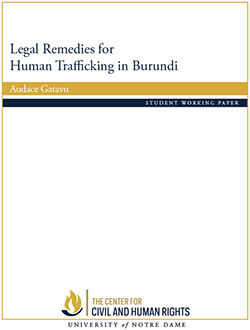
In the web of cause and effect that constitutes the crisis of global human trafficking, one important problem has received insufficient scrutiny – the manner in which victims of human trafficking can access adequate legal remedies. In Spring 2016, Profs. Alexandra Levy and Christine Cervenak, Associate Director of the Center for Civil and Human Rights, co-taught a research seminar at Notre Dame Law School entitled “Legal Remedies for Human Trafficking,” and from that course a body of student research has emerged to help frame this ongoing need.
Asked to analyze the range of remedies available in countries around the globe, the students – many focused on their home country – documented these remedial strategies in light of the 2014 UN basic principles on the right to an effective remedy for victims of human trafficking. The resulting papers are now available on the CCHR website.
Christine Cervenak explains the motivation behind the project: “There is a need to improve human trafficking victims' access to appropriate public and private remedies through effective national legal frameworks and well-informed advocates. CCHR aims to contribute to bridging this justice gap – between what human rights requires for victims and they actually can access – with country-specific research.”
Countries investigated in the course encompass many of the world’s major regions and include Brazil, Bulgaria, Burundi, Colombia, Ecuador, Lithuania, Mexico, Myanmar, Panama, South Africa, and the United Kingdom. Each paper analyzes the remedies available and situates them within the context of the UN principles.